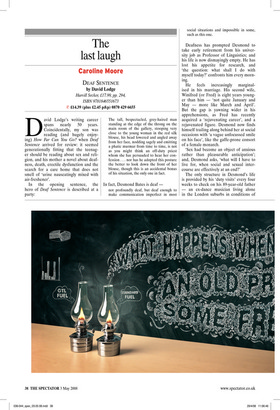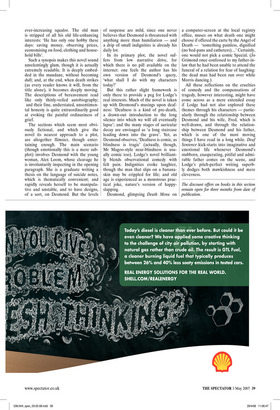The last laugh
Caroline Moore
DEAF SENTENCE by David Lodge Harvdll Secker, £17.99, pp. 294, ISBN 9781846551673 ✆ £14.39 (plus £2.45 p&p) 0870 429 6655 David Lodge’s writing career spans nearly 50 years. Coincidentally, my son was reading (and hugely enjoying) How Far Can You Go? when Deaf Sentence arrived for review: it seemed generationally fitting that the teenager should be reading about sex and religion, and his mother a novel about deafness, death, erectile dysfunction and the search for a care home that does not smell of ‘urine nauseatingly mixed with air-freshener’.
In the opening sentence, the hero of Deaf Sentence is described at a party:
The tall, bespectacled, grey-haired man standing at the edge of the throng on the main room of the gallery, stooping very close to the young woman in the red silk blouse, his head lowered and angled away from her face, nodding sagely and emitting a phatic murmur from time to time, is not as you might think an off-duty priest whom she has persuaded to hear her confession . . . nor has he adopted this posture the better to look down the front of her blouse, though this is an accidental bonus of his situation, the only one in fact.
In fact, Desmond Bates is deaf — not profoundly deaf, but deaf enough to
make communication imperfect in most social situations and impossible in some, such as this one.
Deafness has prompted Desmond to take early retirement from his university job as Professor of Linguistics; and his life is now dismayingly empty. He has lost his appetite for research, and ‘the question: what shall I do with myself today?’ confronts him every morning.
He feels increasingly marginalised in his marriage. His second wife, Winifred (or Fred) is eight years younger than him — ‘not quite January and May — more like March and April’. But the gap is yawning wider in his apprehensions, as Fred has recently acquired a ‘rejuvenating career’, and a rejuvenated figure. Desmond now finds himself trailing along behind her at social occasions with ‘a vague unfocussed smile on his face’, like the gaffe-prone consort of a female monarch.
‘Sex had become an object of anxious rather than pleasurable anticipation’; and, Desmond asks, ‘what will I have to live for, when social and sexual intercourse are effectively at an end?’ The only structure in Desmond’s life is provided by his ‘duty visits’ every four weeks to check on his 89-year-old father — an ex-dance musician living alone in the London suburbs in conditions of ever-increasing squalor. The old man is stripped of all his old life-enhancing interests: ‘He has only one hobby these days: saving money, observing prices, economising on food, clothing and household bills’.
Such a synopsis makes this novel sound unrelentingly glum, though it is actually extremely readable. It is deeply embedded in the mundane, without becoming dull; and, at the end, when death strikes (as every reader knows it will, from the title alone), it becomes deeply moving. The descriptions of bereavement read like only thinly-veiled autobiography; and their fine, understated, unsentimental honesty is quite extraordinarily good at evoking the painful ordinariness of grief.
The sections which seem most obviously fictional, and which give the novel its nearest approach to a plot, are altogether flimsier, though entertaining enough. The main scenario (though emotionally this is a mere subplot) involves Desmond with the young woman, Alex Loom, whose cleavage he is involuntarily inspecting in the opening paragraph. She is a graduate writing a thesis on the language of suicide notes, which is thematically convenient; and rapidly reveals herself to be manipulative and unstable, and to have designs, of a sort, on Desmond. But the levels of suspense are mild, since one never believes that Desmond is threatened with anything more than humiliation — and a drip of small indignities is already his daily lot.
In its primary plot, the novel suffers from low narrative drive, for which there is no pill available on the internet: one feels the author has his own version of Desmond’s query, ‘what shall I do with my characters today?’ But this rather slight framework is only there to provide a peg for Lodge’s real interests. Much of the novel is taken up with Desmond’s musings upon deafness: ‘Deafness is a kind of pre-death, a drawn-out introduction to the long silence into which we will all eventually lapse’; and the many stages of auricular decay are envisaged as ‘a long staircase leading down into the grave’. Yet, as Desmond observes, ‘Deafness is comic, as blindness is tragic’ (actually, though, Mr Magoo-style near-blindness is usually comic too). Lodge’s novel brilliantly blends observational comedy with felt pain. Indignities evoke laughter, though the man that slips on a bananaskin may be crippled for life; and old age is experienced as a monstrous practical joke, nature’s version of happyslapping.
Desmond, glimpsing Death Menu on a computer-screen at the local registry office, muses on what death one might choose if offered the carte by the Angel of Death — ‘something painless, dignified (no bed-pans and catheters)...’ Certainly, one would not pick a comic Special. (Jo Grimond once confessed to my father-inlaw that he had been unable to attend the funeral of a relation for fear of laughing: the dead man had been run over while Morris dancing.) All these reflections on the cruelties of comedy and the compensations of tragedy, however interesting, might have come across as a mere extended essay if Lodge had not also explored these themes through his characters — particularly through the relationship between Desmond and his wife, Fred, which is well-drawn, and through the relationship between Desmond and his father, which is one of the most moving things I have read in a long while. Deaf Sentence kick-starts into imaginative and emotional life whenever Desmond’s stubborn, exasperating, pitiful and admirable father comes on the scene, and Lodge’s pitch-perfect writing superbly dodges both mawkishness and mere cleverness.
The discount offers on books in this section remain open for three months from date of publication.



















































































 Previous page
Previous page